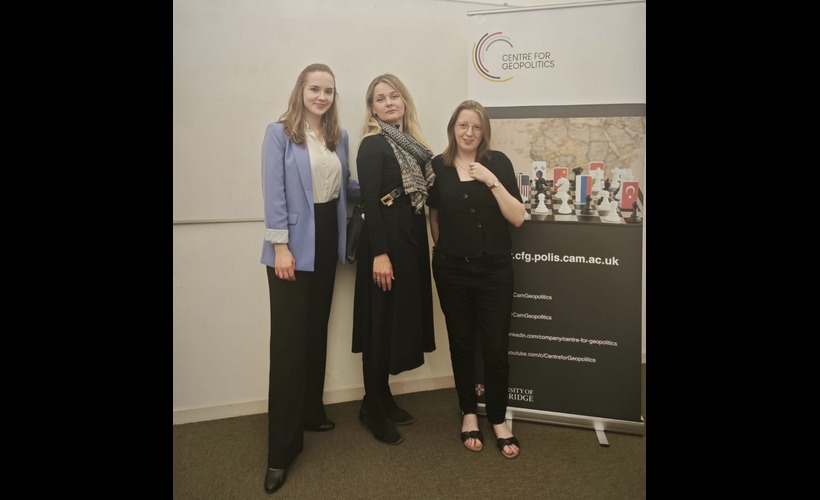By Elvira Tamus, Research Assistant
On 5 March 2024, the Centre for Geopolitics held an event on the ‘Geopolitics of memory in contemporary German-Polish relations’, co-organised and chaired by Prof. Stanley Bill, Professor of Polish Studies at the University of Cambridge. Entanglement between geopolitics and historical memory has long been an object of study in the wider discipline of international relations. While geopolitics produces historical memory, it is also a function of it. Nowhere has this been clearer than in the modern German-Polish relations, where the period of the Second World War takes centre stage in the politics of memory. Some aspects of it, such as the Holocaust, or the Warsaw rising, have been avenues for cooperation between the two countries, while others, such as Polish reparations claims against Germany over the war and occupation, have recently become an object friction. Our guest speakers, leading scholars from Germany and Poland, discussed this important avenue of German-Polish relations.
Prof. Karolina Wigura /Institute of Sociology, University of Warsaw/ addressed the anti-German feeling of Polish conservatives along with a number of misunderstandings of Polish-German relations. She stated that several circumstances have changed since the initially successful reconciliation process between the two states in the 1960s, and the long history of resentment could be very easily manipulated. Prof. Wigura emphasised the role in the current geopolitical constellation of East Central Europe the memory of the 1939 Molotov-Ribbentrop Pact, the trauma of lost statehood catalysed by the full-scale war in Ukraine, and the fact that East Central Europeans have felt for decades a need to prove they were ‘good enough’ for the West.
Dr Florian Peters /Friedrich-Schiller-Universität Jena/ analysed the issue of memory as a prominent factor in German-Polish relations. He claimed that twentieth-century problems and conflicts provided a convenient background for the current geopolitical situation. In addition, Dr Peters pointed out that the memory of post-1989 transformations and the early 1990s should be the context for today’s discussions. He also added that the Solidarity movement was not transformed into a story shared by both countries and the fall of the Berlin wall created new barriers for Poland.
Prof. Prof. Paweł Machcewicz /Institute of Political Studies, Polish Academy of Sciences/ examined the Polish responsibility after World War II, the almost full indignation of Germany in the Polish public opinion, the sufferings of German civilians, the change in the self-perception of Germans (from perpetrators to victims), the emotional and dramatic discussion about Jews killed by Poles and the Polish complexity of the Holocaust. He underlined the ‘dark’ side of Polish history (e.g. anti-semitism, expulsion of Germans), the exploitation of anti-German phobia in Polish political rhetoric, and the contrast between the history of shame versus the history of pride. Furthermore, Prof. Machcewicz explained that his idea of museums having to deal with these sensitive topics, published in a 2007 article, was taken up in by Donald Tusk.
Prof. Claudia Weber /European University Viadrina Frankfurt (Oder)/ recalled her personal disappointment and frustration of seeing posters calling for Germans to ‘pay for the vices of the grandfathers’ when she visited Warsaw seven years ago – she thought that these feelings were over and asked herself about what she ‘must have missed’. She claimed that there is an implied teleology concerning a linear process of historical reconciliation which could be fixed by researching reconciliation as part of geopolitics. Prof. Weber concluded that the high point of the reconciliation debate is over – now we are witnessing geopolitical pragmatism as the German government is willing to pay reparations without calling these reparations.
The lively Q&A session included questions on the Western European critique of rule of law in Poland and how it plays into discussions, the line of polarisation in Poland, historical trauma and what it means for geopolitics, Polish-German relations against the backdrop of the Russian war in Ukraine, the use of historical guilt, the recognition of the Namibian genocide in Germany and the role of non-state actors in this process, non-state action in Poland in terms of reparations, potential Polish-Greek-Jewish cooperation in reparation claims, the level of private and institutional relations between Germany and Poland, anti-German attitudes, right-wing opinion in Germany, the reparation claims not being a political issue in Germany, the Polish minority in Germany, the symbolic and real need for reparations in the Polish society, the ways in which history should be taught in schools, as well as the possibility of a German-Polish agreement on the sum of reparations.







